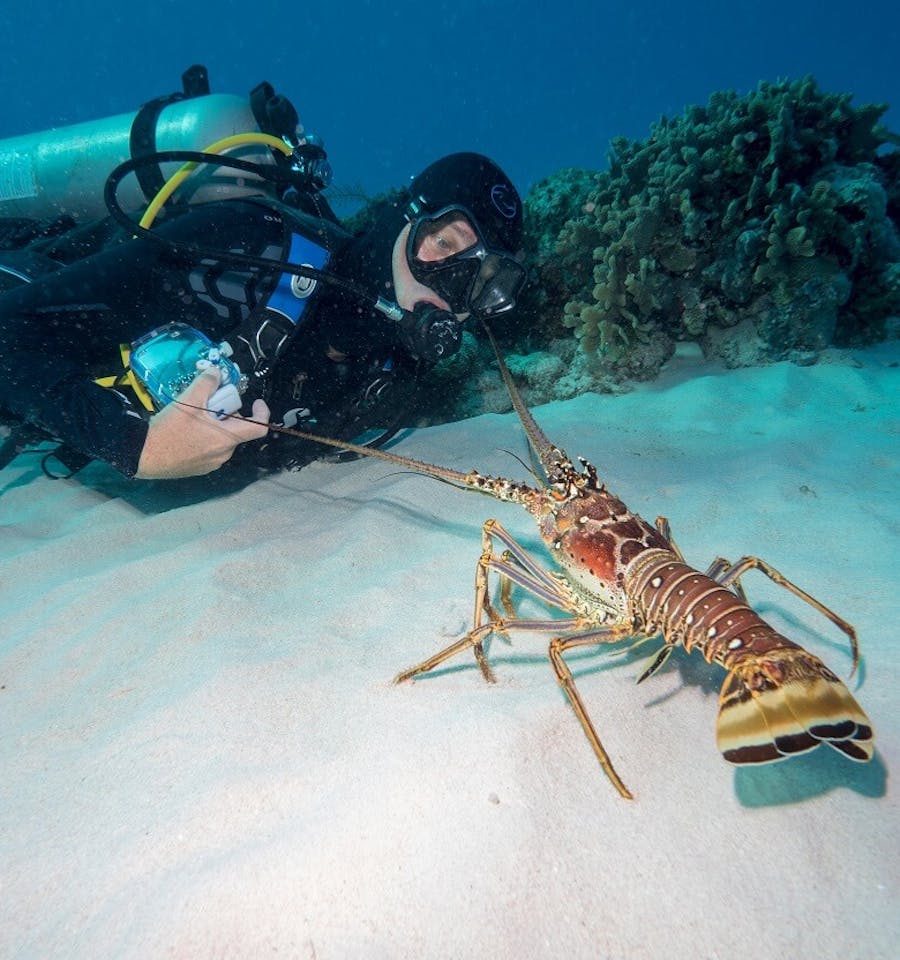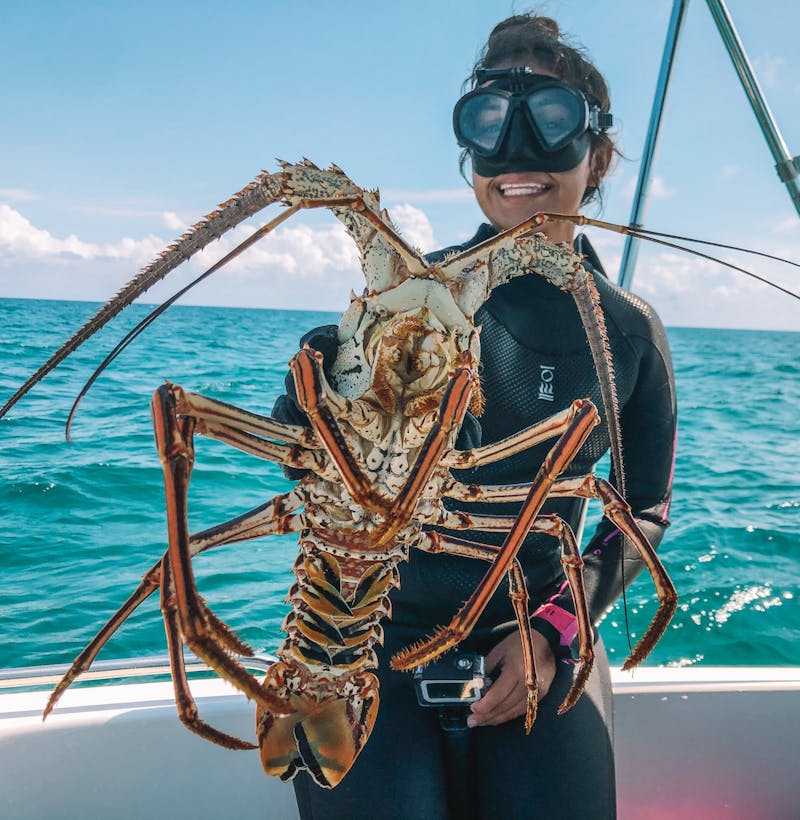Free Shipping on orders of $49+ | Signup for Direct Rewards
Free Shipping on orders of $49+ | Free Store Pickup | Signup for Direct Rewards
Free Shipping on orders of $49+ | Signup for Direct Rewards
Free Shipping on orders of $49+ | Free Store Pickup | Signup for Direct Rewards

We love to talk about lobstering and the different ways you can catch your Florida Spiny Lobster in season. So…if you’re looking to change it up or are on the fence about a preferred way to dive for lobster, let’s delve into the pros and cons of Freediving, Tankless Diving, and Scuba Diving to catch your daily limit in Florida.
Once you master freediving, it really is the simplest, least cumbersome way to dive down and catch some bugs.
At the very least, you’ll don your mask, fins, weight belt, and snorkel, grab your lobster gauge, and head down. Gloves are always a good idea when hunting the Florida Spiny Lobster because those spines are a bit sharp. If you want to take along a tickle stick, catch bag, net, or snare they’re totally optional - depending on your level of experience and skills.
Of course, the less gear you take down, the more streamlined and stealthy you are. And since you’re on one breath at a time, every bit of energy exerted counts and you’ve already got to surface with your catch. Now, if you’re really fast or in an area with multiple lobsters in close proximity, a catch bag might be a good idea so you can bring them all (up to your limit) to the surface without one getting away.
Why is freediving for lobster so great? If you hit it right, you’ll be able to bring up your daily limit in one breath on one dive. It’s been done. Besides, you’re as stealthy as it gets when you’re freediving and you have the greatest range of motion since you’re wearing the least amount of gear. With less gear you’re more streamlined and have less items to keep up with as you catch lobster and work to preserve and respect the reef.
The biggest drawback to this style of diving for lobster is that you’re on one breath at a time. As you get tired, the lobster might get away from you. And with freediving, if they get away, it can be challenging to chase them to their next hiding spot.

© Mac Stone 2017
Required:
Optional:
If freediving isn’t your forte, perhaps you prefer tankless diving (also called Hookah Diving or Surface Supplied Air Diving). This type of diving allows you the comfort of an air supply without the cumbersome gear.
Again you’ll don your mask, fins, snorkel, and grab your lobster gauge. Then attach your regulator hose to your weight belt, put your weight belt on and at the very least grab your catch bag. Gloves are always highly recommended and you might opt to bring a net, tickle stick, and possibly a snare. Turn on and launch your tankless diving unit. When you put that regulator in your mouth and drop below the surface, you’re able to stay down until you catch your limit, need a break, or hit the 30 minute mark. Of course if you’re diving in shallow water, you can stay down much longer if you want. Just don’t forget that all the rules that apply to scuba diving apply to tankless diving as well.

© Mac Stone 2017
Why is tankless diving for lobster so great? You leave the bulk of the gear on the surface so you’re more stealthy than a scuba diver. You also maintain a greater range of motion since you’re wearing less gear and you get the benefit of having air to breathe so you can stay down longer. Since it’s a tankless system, you’re only limited by the amount of gas in the tank or the charge on the battery for your air supply. You’re also able to fit in between some spaces you wouldn’t be able to get into with a scuba tank on your back. And less gear means less to keep track of so you don’t damage the reef as you hunt.
Required:
Optional:
After you attach your BCD and regulator setup to your tank, make sure you load your weights in the weight pockets, don your dive computer, and gear up with your mask, fins, and snorkel, then you’ll grab your lobster gauge. Again, gloves are recommended and you might want to take along your catch bag, a snare, net, and tickle stick as you drop below the surface.
Now, there are certainly some scuba diving lobster hunters that are able to catch and bring to the surface their daily limit with just their gloves, a lobster gauge, and full scuba gear. No net, tickle stick, or snare because they learned how to catch them with their hands. No catch bag because they’ve learned how to stash up to 5 lobster in their BC and hold onto one while surfacing. Yes, even with a safety stop at 15 feet. But most of us aspire to be those people. So for the rest of us…you’ll drop down and mind your gear while keeping an eye on your pressure gauge.
Why is scuba diving for lobster so great? You can go deeper and aren’t tethered to anyone else so you have more freedom to move around (though, still be mindful of your dive buddies down there). You’re also not tethered to an air supply unit on the surface so you can more easily move through and around wrecks and overhead environments to catch the lobster. Though limited to the air in your tank, you can stay down much longer than the freedivers and usually can bag your limit on one to two dives.

Required:
Optional:
All three options can be done from the beach or a boat so which way is best is really up to you and what you’re comfortable with.
So when Lobster season is on, check the dive conditions and make sure your lobstering gear is in proper working order, double check the current regulations, ensure you have your Florida Fishing License and Lobstering Permit, and get out to your favorite coordinates.
Happy Hunting.
Yes. And it’s delicious. With a plethora of ways to prepare this yummy indulgence, we’re sure you’ll find a recipe that draws you to the water every time the season opens.
The tail. That’s where the sweet succulent meat is.
Nope. If you snip off the ‘spines’ first, they’re much easier to handle. Next, cut along the bottom of the carapace and separate it from the tail. Snap off one of the antennae and slide it into the opening at the center of the fins side of the tail, twist and pull. You should get a slimy grey-ish matter. Rinse it and you’re ready to cook up a feast.
Nope. Florida Lobsters do not have claws.
